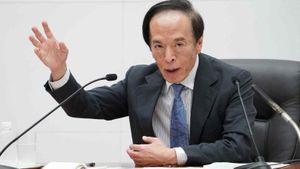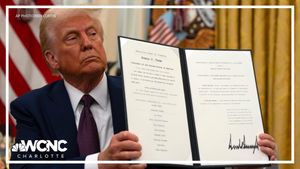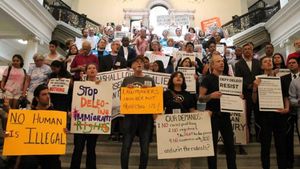Ontario's electric vehicle (EV) sector is at a crossroads as the province gears up for elections amid growing economic uncertainties and potential trade tensions with the United States. Premier Doug Ford, leader of the Progressive Conservative Party, made clear his commitment to the EV industry, vowing to continue investing heavily if re-elected, even as external pressures threaten the market's stability.
Speaking at a campaign event on Thursday, Ford reiterated, "A re-elected PC government will honour our commitment to invest in the sector," emphasizing his administration's pledge to provide financial backing for EV and battery plants. This promise came against the backdrop of ominous warnings from U.S. President Donald Trump, who has suggested imposing 25% tariffs on Canadian imports, including vehicles produced in Ontario, as he seeks to bring manufacturing jobs back to the U.S.
The stakes are high, not only for Ford but for the future of Ontario's auto industry as well. Since Ford's government reached agreements with Stellantis, Volkswagen, and LG Energy Solution to support local battery production, the province has committed substantial investments—to the tune of billions—to compete with American subsidies bolstered by the recent Inflation Reduction Act.
Ford's commitment was met with skepticism from opposition leaders. NDP Leader Marit Stiles expressed her support for the EV sector but raised doubts about the viability of current deals, stating, "Doug Ford does not make good deals for Ontario," and indicating she would review the agreements with Stellantis and Volkswagen closely.
Liberal Leader Bonnie Crombie shared similar concerns, advocating for greater diversification of the provincial economy. Crombie pointed out the risks associated with investing too heavily in the electric vehicle sector without exploring other avenues of industrial growth, stating, "I’m very concerned the premier has put all our eggs in the EV basket."
The looming trade threat from the U.S. adds another layer of complexity. Trump's strategy to impose tariffs could potentially stifle Ontario's burgeoning EV market, one experts believe might already be facing challenges. Ian Lee, a professor at Carleton University, warned, "What Trump is doing is going to kibosh EVs," stressing the need for Ontario to align its policies with market realities.
Despite the potential for tariffs and subsidies being put on the chopping block by the U.S., Ford remains steadfast, asserting, "Even if President Trump tears up America’s commitment to the auto industry, we will not." His administration's intentions signal determination to create stability within the province's EV sector, even amid uncertainty.
The pressure isn't just on the political leaders, either. Unions and workers within Ontario's automotive supply chain are closely watching how election outcomes could impact their livelihoods. With expectations of substantial job creation linked to the EV sector, including thousands of new positions, the outcome of the votes on February 27 will be pivotal.
The economic stakes are high, particularly since Ontario has already disbursed CAD 6.8 billion across projects within the EV sector, forecasting a possible need for CAD 14.3 billion to match U.S. production subsidies. On the ground, this means jobs and investments hinge on both political leadership and decisions made south of the border.
The question of sustainability looms large over the future of Ontario's electric vehicle ambitions. While the market for EVs globally is projected to grow, analysts argue the province must prepare for the possibility of changing consumer demand and international policy shifts. With potential instability, Ontario's leadership will have to demonstrate adaptability to remain competitive.
One potential avenue for boosting the EV sector is through innovations, like battery recycling technologies and renewable energy sources powering new plants, which align with global sustainability goals. Yet, the transition demands skilled labor, and concerns about workforce readiness have been voiced, judging from what experts see as significant gaps within local skill sets needed for EV production.
The upcoming election provides both opportunity and challenge for Ontario's political leaders. With U.S. tariffs looming, the future of the province's electric vehicle sector may rest heavily on who will lead Ontario over the next four years. Will Doug Ford's government continue to push for EV investment, or will opposition leaders reshape the course to diversify the provincial economy?
With significant stakes at play, voters will soon decide who is best suited to navigate the tumultuous waters of electric vehicle production and global market pressures, illustrating the fragile balance of economic opportunity and potential downfall.



